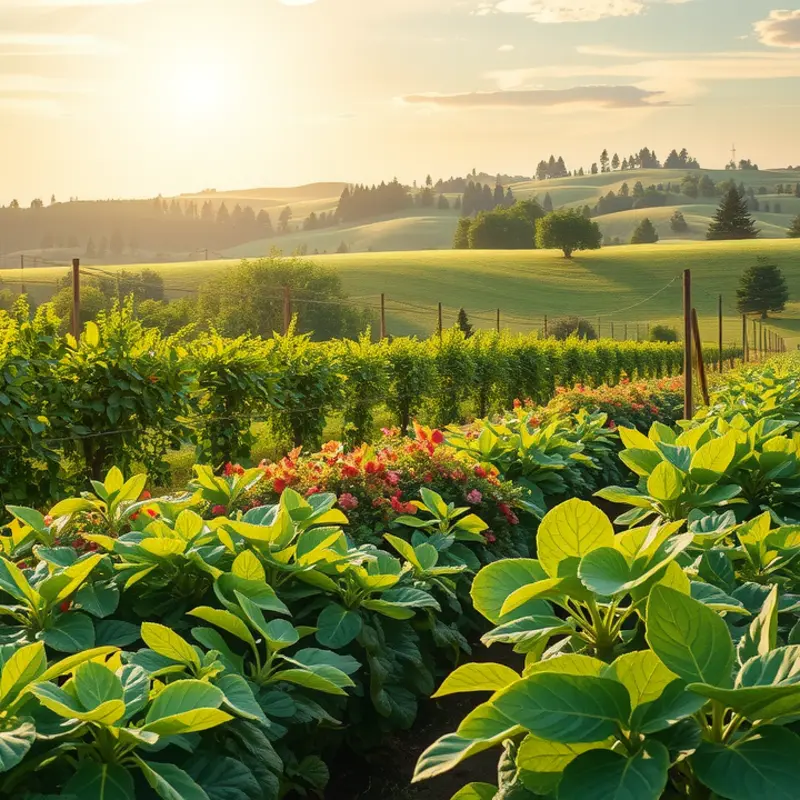Selecting responsibly grown produce plays a crucial role in supporting our environment while also nourishing our bodies. As concern for climate change and sustainable agriculture increases, environmentally-conscious consumers are actively seeking ways to make impactful food choices. This guide provides insight into finding and supporting ethically sourced fruits and vegetables, empowering readers to align their diets with their values and contribute positively to the planet.
The Importance of Locally and Sustainably Grown Produce

Choosing locally and sustainably grown fruits and vegetables is vital for environmental stewardship, economic support, and ensuring nutrition. Opting for local produce can profoundly impact reducing carbon footprints due to shorter transportation distances. By reducing the need for long-haul transport, which often relies on fossil fuels, we play a part in decreasing overall greenhouse gas emissions.
In addition to environmental benefits, buying local produce strengthens community economies. Your purchases help support local farmers who might otherwise struggle against larger corporate competitors. These farmers often reinvest earnings into their operations and communities, promoting economic resilience. Furthermore, local produce tends to be fresher, having been harvested closer to peak ripeness. This freshness not only enhances flavor but also often results in higher nutritional values.
Identifying local sources of sustainably grown produce can begin with visits to your nearest farmers’ markets. These markets provide direct access to fresh produce, often grown without harmful pesticides or chemical fertilizers. Additionally, engaging directly with farmers allows you to inquire about their farming techniques, ensuring practices align with your sustainability values.
Community-supported agriculture (CSA) programs offer another pathway to sustainable choices. By subscribing to a CSA, you receive regular shares of a farm’s produce. This model supports farmers with a guaranteed income, reducing financial risks associated with agriculture. It also fosters a connection between consumers and their food sources, promoting understanding and appreciation of regional seasonal cycles.
Sustainable farming practices can often be identified by certifications such as organic, biodynamic, or regenerative agriculture labels. However, not all sustainable farmers can afford certifications. Direct communication with farmers about their methods can provide insights into their commitment to practices like crop rotation, composting, and integrated pest management.
If you’re exploring eco-friendly kitchen storage, consider reading about low-waste cooking preparation as it complements the production side of sustainability. Embracing a holistic approach to sustainability includes considering the handling of our produce from harvest to consumption.
Ultimately, opting for local and sustainable produce supports the environment, local economies, and personal health. Embrace this practice not just as a consumer choice but as a community commitment. The shift toward sustainable living often begins with our everyday food decisions, and each choice contributes to a broader positive impact.
Recognizing Certifications and Responsible Farming Practices

Understanding food certifications can significantly enhance your journey toward eco-conscious eating. Labels like USDA Organic, Fair Trade, and non-GMO offer insights into farming practices that prioritize the environment, workers, and health. However, interpreting these labels correctly requires more than a superficial glance.
The USDA Organic label certifies that produce is grown without synthetic fertilizers, pesticides, and genetically modified organisms (GMOs). It signifies a commitment to practices that maintain or improve soil and water quality. Choosing USDA Organic helps reduce the toxic load on ecosystems, promoting biodiversity and safer conditions for farmworkers.
Fair Trade certification is crucial for fruits and vegetables sourced from developing countries. It ensures that workers receive fair wages and work in safe conditions. This certification often includes environmentally-friendly farming practices, such as efficient water usage and reduced chemical applications, aligning with sustainability goals.
The non-GMO Project Verified label is a straightforward indicator that a product contains no genetically modified organisms. While the focus is more on genetic modification than on broader environmental practices, this label can support biodiversity by preventing cross-contamination of organic fields with GMO pollen.
Each of these certifications supports specific sustainable practices, but no single label encompasses all aspects of responsible farming. Therefore, consumers must research and evaluate farm and producer practices directly. Many farms provide additional information through websites or open days, allowing you to see their commitment to sustainable practices firsthand.
Adopting a broader awareness of farming certifications not only helps you make informed choices but also encourages producers to maintain transparency. Consumer demand is a powerful catalyst for change. When consumers demonstrate preference for certified products, they signal to producers the value placed on responsible agriculture.
In addition to formal certifications, consider supporting local farms practicing sustainable agriculture, even if they do not carry official certifications. Community-supported agriculture (CSA) programs offer a direct way to engage with local producers. Many small farms cannot afford expensive certifications despite their adherence to sustainable practices. Visiting local farmers’ markets, conversing with vendors, and inquiring about their farming methods can provide valuable insights.
As we navigate the path to sustainability, recognizing and understanding food certifications plays a crucial role. Labels not only inform us about the environmental and social impact of our food choices but also empower us to influence industry practices. For practical ways to incorporate sustainability at home, consider exploring tips on Eco-Smart Kitchen Storage, which integrates sustainability into everyday life.
Ultimately, aligning food choices with environmental values is both a personal and community effort. By making informed decisions, you contribute to a larger movement advocating for transparency and sustainability within the agriculture industry. Through enhanced consumer awareness, we can pave the way for more responsible food production practices.
Final words
Choosing responsibly grown produce is not merely an act of personal nourishment; it fosters a healthier planet for generations to come. By supporting local and sustainable farming practices, you contribute to reducing environmental impact, promoting biodiversity, and supporting the local economy. Stay informed about produce certifications and seek out farmers in your community who practice eco-friendly methods. Every small change you make in your purchasing choices can collectively lead to a significant impact. Embrace the journey of eco-conscious eating, and inspire others to join you in making sustainable food choices.








